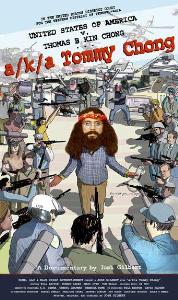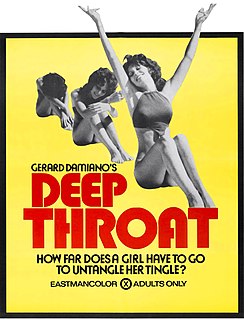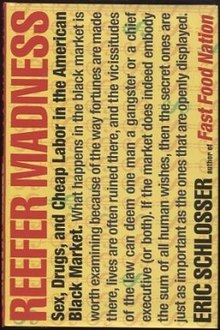Reefer Madness is a 1936 anti-marijuana propaganda film.

Fast Food Nation: The Dark Side of the All-American Meal is a 2001 book by Eric Schlosser. First serialized by Rolling Stone in 1999, the book has drawn comparisons to Upton Sinclair's 1906 muckraking novel The Jungle. The book was adapted into a 2006 film of the same name, directed by Richard Linklater.

Pornographic films (pornos), erotic films, or sex films are films that present sexually explicit subject matter in order to arouse and satisfy the viewer. Pornographic films present sexual fantasies and usually include erotically stimulating material such as nudity (softcore) and sexual intercourse (hardcore). A distinction is sometimes made between "erotic" and "pornographic" films on the basis that the latter category contains more explicit sexuality, and focuses more on arousal than storytelling, but the distinction is highly subjective.

Marie Louise Hartman, known professionally as Nina Hartley, is an American pornographic film actress and director, sex educator, sex-positive feminist, and author.

The term "prison–industrial complex" (PIC), after the "military–industrial complex" of the 1950s, describes the attribution of the rapid expansion of the US inmate population to the political influence of private prison companies and businesses that supply goods and services to government prison agencies for profit. According to this concept the most common agents of PIC are corporations that contract cheap prison labor, construction companies, surveillance technology vendors, companies that operate prison food services and medical facilities, correctional officers unions, private probation companies, lawyers, and lobby groups that represent them.

Eric Matthew Schlosser is an American journalist and author known for his investigative journalism, such as in his books Fast Food Nation (2001), Reefer Madness (2003), and Command and Control: Nuclear Weapons, the Damascus Accident, and the Illusion of Safety (2013).

Superprofit, surplus profit or extra surplus-value is a concept in Karl Marx's critique of political economy subsequently elaborated by Vladimir Lenin and other Marxist thinkers.

Reuben Sturman, sometimes referred as the "Walt Disney of Porn", was an American pornographer and businessman from Ohio, who co-founded sex toys company Doc Johnson. He was featured as a subject in Eric Schlosser's 2003 book on underground economies, Reefer Madness: Sex, Drugs, and Cheap Labor in the American Black Market.

Reefer Madness is a 1936 American exploitation film about drugs, revolving around the melodramatic events that ensue when high school students are lured by pushers to try marijuana—from a hit and run accident, to manslaughter, suicide, conspiracy to murder, attempted rape, hallucinations, and descent into madness from marijuana addiction. The film was directed by Louis J. Gasnier and featured a cast of mainly little-known actors.

a/k/a Tommy Chong is a 2006 documentary film written, produced, and directed by Josh Gilbert, that chronicles the Drug Enforcement Administration raid on comedian Tommy Chong's house and his subsequent jail sentence for trafficking in illegal drug paraphernalia. He was sentenced to nine months in federal prison. DEA agents raided Chong's Pacific Palisades, California home on the morning of February 24, 2003. The raid was part of Operation Pipe Dreams and "Operation Headhunter," which resulted in raids on 100 homes and businesses nationwide that day and indictments of 55 individuals.

The term "Golden Age of Porn", or "porno chic", refers to a 15-year period (1969–1984) in commercial American pornography, which spread internationally, in which sexually explicit films experienced positive attention from mainstream cinemas, movie critics, and the general public. It began with release of the 1969 film Blue Movie directed by Andy Warhol, and the 1970 film Mona produced by Bill Osco. These films were the first adult erotic films depicting explicit sex to receive wide theatrical release in the United States. Both influenced the making of films such as 1972's Deep Throat starring Linda Lovelace and directed by Gerard Damiano, Behind the Green Door starring Marilyn Chambers and directed by the Mitchell brothers, 1973's The Devil in Miss Jones also by Damiano, and 1976's The Opening of Misty Beethoven by Radley Metzger. According to Warhol, Blue Movie was a major influence in the making of Last Tango in Paris, an internationally controversial erotic drama film, starring Marlon Brando, and released a few years after Blue Movie was made.

The Hundred Year Lie: How Food And Medicine Are Destroying Your Health (2006) is a book by investigative journalist Randall Fitzgerald that examines the rise of the local and global influence of the United States food and chemical industries, and argues that they have, over the last century, altered, affected and damaged the lives of millions of people in the United States by introducing synthetic chemicals into the mainstream food chain.

Adam & Eve is a conglomerate company that sells sex toys, vibrators, condoms, and lingerie, as well as funding non-profit social marketing organizations that address issues such as population growth, disease control and sex education in developing countries. The company is the largest e-commerce distributor of condoms, sex toys, and erotica in the United States. Founder Phil Harvey has been called "one of the most influential figures in the American sex industry today". Its parent company, PHE Inc., is the largest private employer in Hillsborough, North Carolina, where its headquarters are situated.
Unreported employment, also known as money under the table, working under the table, off the books, cash-in-hand, or illicit work is illegal employment that is not reported to the government. The employer or the employee often does so for tax evasion or avoiding and violating other laws such as obtaining unemployment benefits while being employed. The working contract is made without social security costs, and does typically not provide health insurance, paid parental leave, paid vacation or pension funds. It is a part of what has been called the underground economy, shadow economy, black market or the non-observed economy.

A black market, underground economy or shadow economy, is a clandestine market or series of transactions that has some aspect of illegality or is characterized by some form of noncompliant behavior with an institutional set of rules. If the rule defines the set of goods and services whose production and distribution is prohibited by law, non-compliance with the rule constitutes a black market trade since the transaction itself is illegal. Parties engaging in the production or distribution of prohibited goods and services are members of the illegal economy. Examples include the drug trade, prostitution, illegal currency transactions and human trafficking. Violations of the tax code involving income tax evasion constitute membership in the unreported economy.

The sex industry consists of businesses that either directly or indirectly provide sex-related products and services or adult entertainment. The industry includes activities involving direct provision of sex-related services, such as prostitution, strip clubs, host and hostess clubs and sex-related pastimes, such as pornography, sex-oriented men's magazines, sex movies, sex toys and fetish or BDSM paraphernalia. Sex channels for television and pre-paid sex movies for video on demand, are part of the sex industry, as are adult movie theaters, sex shops, peep shows, and strip clubs.

Terms related to cannabis include:

The green rush is an ongoing global economic event that began on December 6, 2012, when cannabis was legalized in the US state of Washington; Colorado's legalization took effect four days later. While still illegal federally in the United States, the actions of these two state governments signaled the opening of a market projected to be worth US$48+ billion globally by 2027. As of 2019 the cannabis industry had created over 250,000 jobs. However, cannabis companies have been a mixed investment success, with many experiencing plunging stock prices, massive layoffs, and failure to meet investor expectations.
















